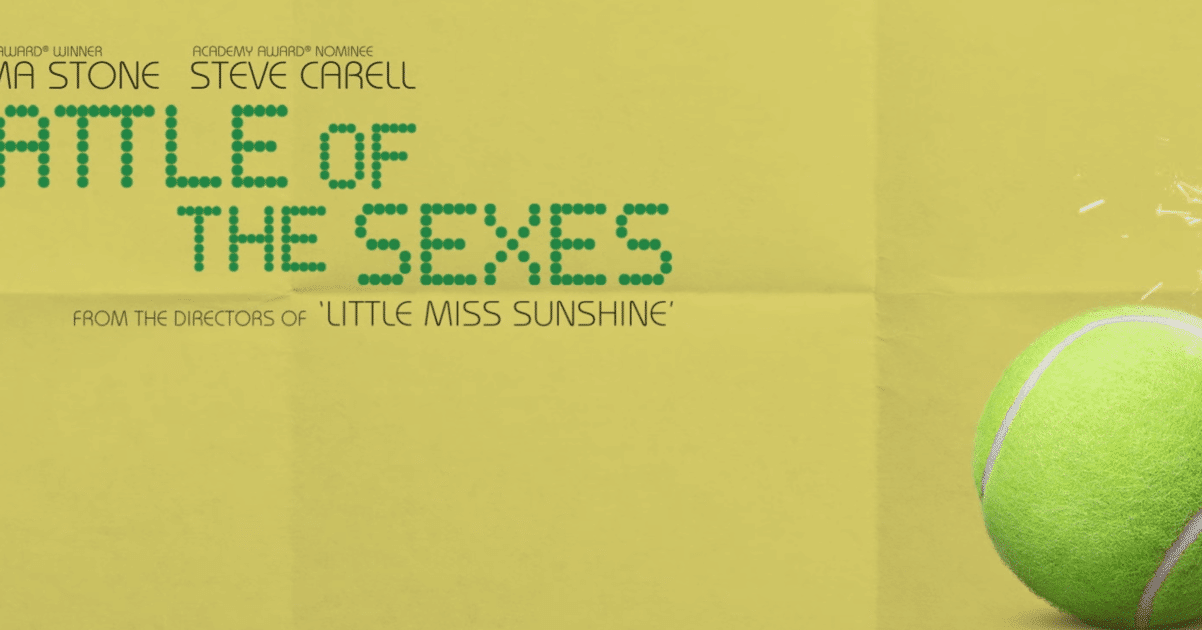“Love” is a funny term in the tennis world, as it literally means “nothing.” To have a score of love means you’re not on the board; it’s an absence of progress in the game.
As she’s portrayed in the new film Battle of the Sexes, tennis icon Billie Jean King (Emma Stone) has much the same idea of love as the game does. Her husband Larry (Austin Stowell) doesn’t travel with her, for fear of distraction. She says as much to a new woman in her life, hairdresser Marilyn (Andrea Riseborough), as she feels her focus being pulled away from tennis and onto their beautiful-but-risky affair.
Love prevents progress in Billie Jean’s eyes. Larry puts it succinctly to Marilyn in one crucial mid-film scene: As husband and lover, they are “sideshows” to Billie’s one true commitment: tennis.
But it’s not love that truly hampers Billie Jean’s game it’s her inability to be honest with herself and admit that she’s a lesbian. Directors Jonathan Dayton and Valerie Faris smartly never let Billie’s sexuality out of the spotlight, making Battle of the Sexes a more compelling character study than it appears to be.
The big key to understanding the film is knowing that its title is a misdirection. Yes, the infamous 1973 tennis match of the same name is the climactic event in the film, but Billie Jean’s victory over self-declared chauvinist pig Bobby Riggs (Steve Carell) is merely a triumph in a much larger war. Billie’s true battle is for equality, as she fights back against a system that sees her as less-than because of her gender. She’s paid less than male players, seen as less “exciting” than male players, and the match against Bobby is merely a chance to prove her worth in the game she loves in a national spotlight.
This battle has layers, of course, because Billie Jean’s outward-facing war for gender equality is not her only war. Her queerness makes her drive to be seen as equal and legitimate all the more heart-wrenching. Even after her eventual victory over Bobby, she’s still not braced to be herself in front of the masses. She says as much to Ted Tinling (Alan Cumming), her friend and tennis dress designer, before taking her victory lap.
“Times change,” Ted says with winking acknowledgment of her inner struggle. “You should know; you just changed them.”
Battle of the Sexes is a better movie for its focus on Billie Jean’s sexuality. We see her immense fight with her desires in her affair with Marilyn. Both Stone and Riseborough effectively play the complications of their love without making their characters tragic. It’s intimate work, much being said in silences and glances. The scene where the women kiss for the first time is superb, slow in pace but unflinching when the two do finally come together.
Unfortunately, this means whenever the focus does shift, Battle of the Sexes weakens. Bobby would’ve best served as an even more ancillary character. Bobby Riggs is a caricature in most of his scenes, consistent with the tennis court jester persona he put on during the era of the film. In his 50s and hardly a peak player, Bobby represents the sloth and pride that’s allowed to still come out on top thanks to entrenched patriarchy. A more successful woman has to try twice as hard to be taken seriously as a buffoon simply because of her gender. (Sound familiar?)
Had Battle of the Sexes been content to let him stay a caricature, and devote more time to Billie Jean (and Stone’s superior performance), the film would have been less even-handed, perhaps, but ultimately more focused. The film’s attempts to humanize Bobby, be it in his relationship with his son or wife, always ring somewhat hollow, though Carell handles the scenes ably.
Those scenes are just marking time until the narrative returns to Billie Jean where it truly belongs. Her battle is the film’s true battle: for the world to see her and her gender as equal. She is a gay woman fighting for legitimacy in an industry that puts an asterisk by all her accomplishments simply because of who she is. Even knowing the outcome of her match against Bobby, watching her succeed is cathartic. Equality may still be a distant dream for her time period (hell, it’s still a dream today), but in that one moment, Billie Jean proves herself. She is worthy of equal treatment, of being accepted, and of love.
Battle of the Sexes is in theaters now.
Don't forget to share:
Help make sure LGBTQ+ stories are being told...
We can't rely on mainstream media to tell our stories. That's why we don't lock our articles behind a paywall. Will you support our mission with a contribution today?
Cancel anytime · Proudly LGBTQ+ owned and operated
Read More in Culture
The Latest on INTO
Subscribe to get a twice-weekly dose of queer news, updates, and insights from the INTO team.
in Your Inbox













